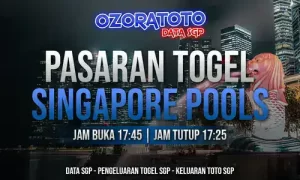
Data SGP – Pengeluaran Togel SGP – Keluaran Toto SGP Hari Ini
Data SGP – Dapatkan informasi terkini mengenai Data SGP (Singapore Pools) di sini. Kami menyediakan update terbaru mengenai Tabel pengeluaran Togel SGP dan keluaran Toto SGP setiap harinya. Dengan informasi lengkap dan akurat, Anda dapat memantau data sgp hasil undian Togel SGP secara real-time.
Jangan lewatkan kesempatan untuk selalu update dengan hasil keluaran toto SGP hari ini dan pastikan Anda tidak ketinggalan informasi terbaru untuk strategi bermain Togel SGP Anda.
Pengeluaran Togel SGP Terlengkap
Pengeluaran togel SGP terlengkap mengenai togel SGP. Kami memfasilitasi keluaran terbaru dan akurat hari ini mengenai hasil undian Togel singapore setiap harinya. Dengan informasi tabel paling lengkap ini.
Anda dapat memantau hasil keluaran Togel SGP secara cepat dan memperoleh data akurat yang dapat dipercaya untuk strategi permainan togel Anda. Jangan lewatkan kesempatan untuk mendapatkan update hasil keluaran Togel SGP terbaru dan pastikan Anda untuk selalu mengunjungi situs ini.
Keluaran Toto SGP Tercepat dan Paling AkuratKami menyediakan informasi terbaru dan terpercaya mengenai keluaran Toto SGP paling update dan Akurat. Dengan layanan kami, Anda dapat memantau hasil keluaran Toto SGP dengan cepat dan akurat melalui tabel yang tersedia.Anda tidak akan mungkin ketinggalan result SGP dapatkan keunggulan dengan informasi tercepat. Dan terakurat mengenai keluaran Toto SGP. Kami memastikan bahwa data yang kami sajikan selalu update dan dapat diandalkan untuk membantu keperluan permainan Anda.Pastikan Anda mengunjungi situs kami secara teratur untuk mendapatkan hasil keluaran toto sgp terbaru dan menjadi yang pertama mengetahui angka-angka yang keluar. Dengan informasi yang tepat waktu dan akurat, Anda dapat meningkatkan peluang kemenangan Anda dalam permainan Togelers Toto SGP.Kami menyajikan informasi paling lengkap dan terupdate tentang data Singapore untuk memenuhi kebutuhan informasi Anda. Selain hasil pengeluaran Singapore, kami juga menyediakan live draw dan tabel statistik akurat yang mencakup berbagai aspek permainan togel SGP.Informasi ini dapat membantu Anda dalam merumuskan strategi taruhan yang lebih baik. Tentunya selain menyediakan data SGP kami juga menyediakan Live Draw HK paling akurat yang bisa kamu dapatkanData yang kami sajikan bukan hanya sekadar informasi tetapi juga alat yang dapat membantu Anda dalam memasang angka sgp. Dengan memahami pola dan keluaran angka yang terkandung dalam tabel, Anda dapat membuat keputusan taruhan yang lebih menguntungkan.Situs resmi data keluaran SGP adalah sumber terpercaya untuk mendapatkan informasi yang Anda butuhkan guna meningkatkan peluang Anda dalam permainan togel SGP.Situs kami merupakan sumber resmi paling akurat dan terupdate yang menyediakan kumpulan data Singapore. Yang tentunya akan sangat membantu anda dalam memantau hasil SGP secara real-time.Live draw SGP Hari Ini Pukul Berapa?Umumnya live draw SGP di mulai pada jam 17:30 Sore dan akan berlangsung selama kurang lebih setengah jam sebelum result utama keluar.Tentu nya untuk live draw SGP tercepat bisa kamu dapatkan hanya di situs OzoraToto. Selain itu Live Draw SGP hanya tersedia pada hari, Senin, Rabu, Kamis, Sabtu, dan Minggu.SGP hari apa saja?
Pada Umumnya Toto SGP OzoraToto tersedia pada hari Senin, Rabu, Kamis, Sabtu, dan Minggu.
Tetapi mungkin juga terjadi perubahan dari hari kami menjadi hari jumat yang sudah pasti akan di informasikan sebelumnya. Untuk mendapatkan Data SGP yang paling akurat hanya bisa kamu dapatkan pada situs ini.
| April 2024 | ||
|---|---|---|
| Tanggal | Hari | Result |
| 28-Apr-2024 | Sabtu | – |
| 25-Apr-2024 | Kamis | 0608 |
| 24-Apr-2024 | Rabu | 2922 |
| 22-Apr-2024 | Senin | 9902 |
| 21-Apr-2024 | Minggu | 4017 |
| 20-Apr-2024 | Sabtu | 0737 |
| 18-Apr-2024 | Kamis | 1954 |
| 17-Apr-2024 | Rabu | 8276 |
| 15-Apr-2024 | Senin | 8796 |
| 14-Apr-2024 | Minggu | 9406 |
| 13-Apr-2024 | Sabtu | 3779 |
| 11-Apr-2024 | Kamis | 1373 |
| 10-Apr-2024 | Rabu | 6763 |
| 8-Apr-2024 | Senin | 7748 |
| 7-Apr-2024 | Minggu | 2194 |
| 6-Apr-2024 | Sabtu | 4437 |
| 4-Apr-2024 | Kamis | 7733 |
| 3-Apr-2024 | Rabu | 1755 |
| 1-Apr-2024 | Senin | 0611 |
| Maret 2024 | ||
| Tanggal | Hari | Result |
| 31-Mar-2024 | Minggu | 3914 |
| 30-Mar-2024 | Sabtu | 7275 |
| 28-Mar-2024 | Kamis | 1389 |
| 27-Mar-2024 | Rabu | 1356 |
| 25-Mar-2024 | Senin | 8563 |
| 24-Mar-2024 | Minggu | 0154 |
| 23-Mar-2024 | Sabtu | 8233 |
| 21-Mar-2024 | Kamis | 6221 |
| 20-Mar-2024 | Rabu | 3191 |
| 18-Mar-2024 | Senin | 0504 |
| 17-Mar-2024 | Minggu | 2874 |
| 16-Mar-2024 | Sabtu | 6899 |
| 14-Mar-2024 | Kamis | 0070 |
| 13-Mar-2024 | Rabu | 3235 |
| 11-Mar-2024 | Senin | 9719 |
| 10-Mar-2024 | Minggu | 6663 |
| 9-Mar-2024 | Sabtu | 2312 |
| 7-Mar-2024 | Kamis | 6150 |
| 6-Mar-2024 | Rabu | 4719 |
| 4-Mar-2024 | Senin | 2554 |
| 3-Mar-2024 | Minggu | 2468 |
| 2-Mar-2024 | Sabtu | 4120 |
| Februari 2024 | ||
| Tanggal | Hari | Result |
| 29-Feb-2024 | Kamis | 2928 |
| 28-Feb-2024 | Rabu | 9747 |
| 26-Feb-2024 | Senin | 2630 |
| 25-Feb-2024 | Minggu | 4026 |
| 24-Feb-2024 | Sabtu | 5131 |
| 23-Feb-2024 | Jumat | 7341 |
| 21-Feb-2024 | Rabu | 2990 |
| 19-Feb-2024 | Senin | 1460 |
| 18-Feb-2024 | Minggu | 3803 |
